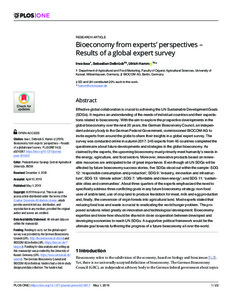Aufsatz

Bioeconomy from experts’ perspectives - Results of a global expert survey
Zusammenfassung
Effective global collaboration is crucial to achieving the UN Sustainable Development Goals (SDGs). It requires an understanding of the needs of individual countries and their expectations related to bioeconomy. With the aim to explore the prospective developments in the global bioeconomy over the next 20 years, the German Bioeconomy Council, an independent advisory body to the German Federal Government, commissioned BIOCOM-AG to invite experts from around the globe to share their insights in a global expert survey. The survey was conducted online in autumn 2017. 345 experts from 46 countries completed the questionnaire about future developments and strategies in the global bioeconomy. As claimed by the experts, the upcoming bioeconomy must primarily meet humanity’s needs in the energy, agriculture, and food sectors. Moreover, innovative products based on renewable resources are anticipated to be of great importance. Even though all UN SDGs will be affected by future bioeconomy success stories, five SDGs stood out within the sample: SDG 12: ‘responsible consumption and production’; SDG 9: ‘industry, innovation and infrastructure’; SDG 13: ‘climate action’; SDG 7: ‘affordable and clean energy’; and SDG 11: ‘sustainable cities and communities’. About three quarters of the experts emphasized the need to specifically address three conflicting goals in any future bioeconomy strategy: non-food uses of arable land, use of crop land to produce feedstock for meat, milk and egg production and, finally, the conversion of virgin forests into agricultural land. Most experts stated that reducing food loss and waste is crucial to eradicating the world hunger problem. The proposed solutions relied greatly on innovation and technological development. Bioeconomy expertise and know-how should be shared in close cooperation between developed and developing economies to reach UN SDGs. A supportive political framework would be the ultimate goal towards furthering the progress of a future bioeconomy all over the world.
Zitierform
In: PLoS ONE 14 / 5 (2019-05-01) , S. e0215917 ; ISSN: 1932-6203Förderhinweis
Gefördert durch den Publikationsfonds der Universität KasselZitieren
@article{doi:10.17170/kobra-20190520492,
author={Issa, Irwa and Delbrück, Sebastian and Hamm, Ulrich},
title={Bioeconomy from experts’ perspectives - Results of a global expert survey},
journal={PLoS ONE},
year={2019}
}
0500 Oax 0501 Text $btxt$2rdacontent 0502 Computermedien $bc$2rdacarrier 1100 2019$n2019 1500 1/eng 2050 ##0##http://hdl.handle.net/123456789/11251 3000 Issa, Irwa 3010 Delbrück, Sebastian 3010 Hamm, Ulrich 4000 Bioeconomy from experts’ perspectives - Results of a global expert survey / Issa, Irwa 4030 4060 Online-Ressource 4085 ##0##=u http://nbn-resolving.de/http://hdl.handle.net/123456789/11251=x R 4204 \$dAufsatz 4170 7136 ##0##http://hdl.handle.net/123456789/11251
<resource xsi:schemaLocation="http://datacite.org/schema/kernel-2.2 http://schema.datacite.org/meta/kernel-2.2/metadata.xsd"> 2019-05-22T06:22:52Z 2019-05-22T06:22:52Z 2019-05-01 doi:10.17170/kobra-20190520492 http://hdl.handle.net/123456789/11251 Gefördert durch den Publikationsfonds der Universität Kassel eng Urheberrechtlich geschützt https://rightsstatements.org/page/InC/1.0/ 630 Bioeconomy from experts’ perspectives - Results of a global expert survey Aufsatz Effective global collaboration is crucial to achieving the UN Sustainable Development Goals (SDGs). It requires an understanding of the needs of individual countries and their expectations related to bioeconomy. With the aim to explore the prospective developments in the global bioeconomy over the next 20 years, the German Bioeconomy Council, an independent advisory body to the German Federal Government, commissioned BIOCOM-AG to invite experts from around the globe to share their insights in a global expert survey. The survey was conducted online in autumn 2017. 345 experts from 46 countries completed the questionnaire about future developments and strategies in the global bioeconomy. As claimed by the experts, the upcoming bioeconomy must primarily meet humanity’s needs in the energy, agriculture, and food sectors. Moreover, innovative products based on renewable resources are anticipated to be of great importance. Even though all UN SDGs will be affected by future bioeconomy success stories, five SDGs stood out within the sample: SDG 12: ‘responsible consumption and production’; SDG 9: ‘industry, innovation and infrastructure’; SDG 13: ‘climate action’; SDG 7: ‘affordable and clean energy’; and SDG 11: ‘sustainable cities and communities’. About three quarters of the experts emphasized the need to specifically address three conflicting goals in any future bioeconomy strategy: non-food uses of arable land, use of crop land to produce feedstock for meat, milk and egg production and, finally, the conversion of virgin forests into agricultural land. Most experts stated that reducing food loss and waste is crucial to eradicating the world hunger problem. The proposed solutions relied greatly on innovation and technological development. Bioeconomy expertise and know-how should be shared in close cooperation between developed and developing economies to reach UN SDGs. A supportive political framework would be the ultimate goal towards furthering the progress of a future bioeconomy all over the world. open access Issa, Irwa Delbrück, Sebastian Hamm, Ulrich doi:10.1371/journal.pone.0215917 publishedVersion ISSN: 1932-6203 5 PLoS ONE e0215917 14 </resource>
Die folgenden Lizenzbestimmungen sind mit dieser Ressource verbunden:
Urheberrechtlich geschützt

